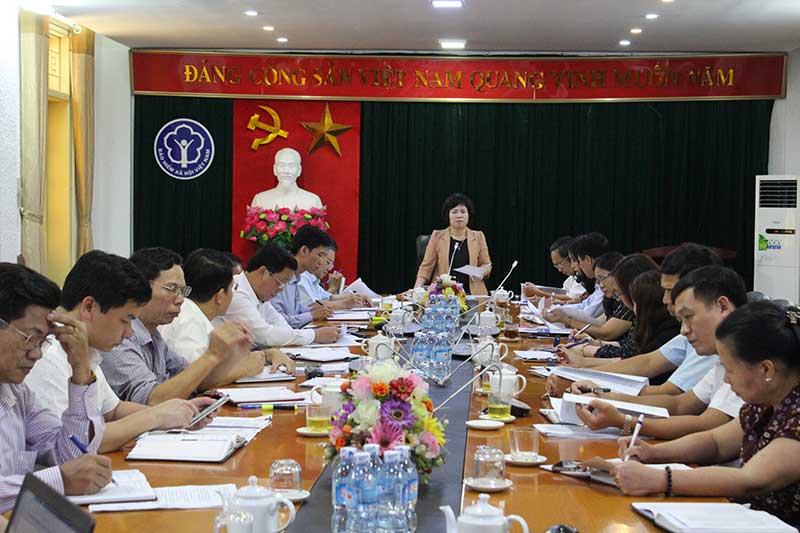
(HBO) – A delegation from the Committee for Ethnic Affairs of the Hoa Binh People’s Council led by head of the committee Nguyen Thi Oanh had a working session on October 30 at the provincial Social Security Agency and the Department of Labour, Invalids and Social Affairs to supervise the implementation of health insurance among the ethnic minority communities in the locality in the 2015-2018 period.
 Nguyen Thi Oanh, head
of the Committee for Ethnic Affairs of the Hoa Binh People’s Council, head of
the provincial Party Committee’s Mass Mobilisation Commission and President of
the province’s Vietnam Fatherland Front Committee, addresses the session.
Nguyen Thi Oanh, head
of the Committee for Ethnic Affairs of the Hoa Binh People’s Council, head of
the provincial Party Committee’s Mass Mobilisation Commission and President of
the province’s Vietnam Fatherland Front Committee, addresses the session.
At the end of 2018, the coverage of health insurance in Hoa Binh
reached 96.6 percent of the local population. Allof the residents from ethnic
minority communities living in disadvantageous areas received free health
insurance in line with regulations.
The provincial Social Security Agency has fully applied
health insurance policies on ethnic minority communities in a timely manner,
ensuring the rights of people joining the insurance.
However, shortcomings and limitations have still lingered in
the implementation of health insurance policies among ethnic minority communities
in some localities.
Concluding the supervision session, Oanh, who is also head
of the provincial Party Committee’s Mass Mobilisation Commission and President
of the province’s Vietnam Fatherland Front Committee, asked the provincial
Social Security Agency and Department of Labour, Invalids and Social Affairs to
continue promoting communications and the implementation of health insurance
policies for ethnic minority residents across the province.
It is necessary to mobilize resources for the improvement of
health care infrastructure and equipment, thus enhancing service quality, she
said, stressing the need for strengthening the inspection and settlement of
complaints and denouncements related to the implementation of health insurance
policies.
At the same time, the health insurance fund must be used in
an effective manner, she added.
Regarding the proposals of the two units, she said that the supervision
team will gather all ideas and forward them to relevant agencies for
consideration and adjustments to suit the reality./.
With just over a month left until the school summer break, students are eagerly anticipating a period of rest and fun after a year of academic pressure. To provide a healthy environment for the physical development, in addition to the classes that foster talents and enhance the academic knowledge, sports and physical activities continue to attract a large number of children and teenagers.
On April 17th, Hoa Binh Provincial Museum organized a program to promote and introduce the outstanding values of "Hoa Binh Culture” at the Boarding Secondary and High School for ethnic minority students in Mai Chau District.
The Hoa Binh College of Technical Technology, in collaboration with the Hoa Binh Technical and Economic College and the provincial Association of Literature and Arts, hosted a gathering on April 15 to celebrate Laos’ traditional Bunpimay (New Year) Festival 2025 and debut the new book "Nguoi Muong o ban Don” (Muong people in Don village).
In the millennia-long history of national construction and safeguarding, people of all ethnic groups in Hoa Binh have been united and closely bound together to overcome all difficulties and challenges, standing alongside the entire Vietnamese people throughout the history of building and defending the country.
Living green is a healthy, positive, and sustainable lifestyle that not only helps protect
the environment and quality of life but also conserves natural resources and ecosystems.
Among the many ways to embrace this lifestyle, reducing plastic consumption is one of the most impactful.
The women's unions at all levels in Kim Boi district have been making significant contributions to the movement of building cultural life in the local community.
The movement helps improve rural look and the spiritual and material lives of local residents.



 Nguyen Thi Oanh, head
of the Committee for Ethnic Affairs of the Hoa Binh People’s Council, head of
the provincial Party Committee’s Mass Mobilisation Commission and President of
the province’s Vietnam Fatherland Front Committee, addresses the session.
Nguyen Thi Oanh, head
of the Committee for Ethnic Affairs of the Hoa Binh People’s Council, head of
the provincial Party Committee’s Mass Mobilisation Commission and President of
the province’s Vietnam Fatherland Front Committee, addresses the session.